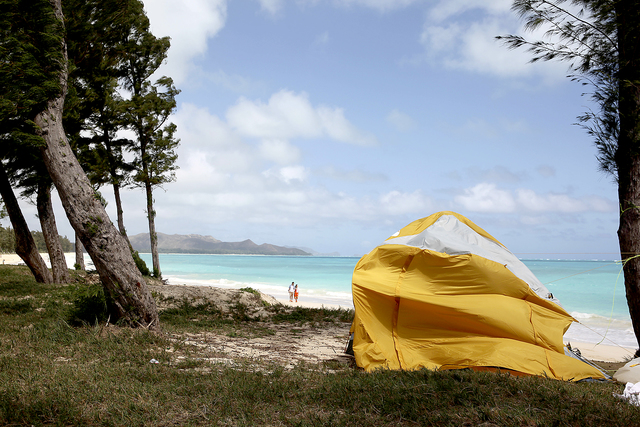HONOLULU — Hawaii lawmakers are taking aim at a burgeoning vacation rental market: online brokers offering up tents to tourists on the islands’ world-class beaches and public parks. ADVERTISING HONOLULU — Hawaii lawmakers are taking aim at a burgeoning vacation
HONOLULU — Hawaii lawmakers are taking aim at a burgeoning vacation rental market: online brokers offering up tents to tourists on the islands’ world-class beaches and public parks.
The state Senate passed legislation Thursday cracking down on a growing trend of campsites advertised as vacation rentals on online lodging services such as Airbnb. The websites allow people to list and book private housing, and some are touting luxury campsites with comfy pillows, mattresses and access to paradise for $40 to $100 a night.
With tag lines promising “Luxury Glamping in Paradise!” or a way to “See Maui on a Budget,” the ads feature campsites in state parks, in backyards or on beaches that are not necessarily legal. The popularity of “glamping,” or glamorous camping, has grown as more people seek luxury amenities in the outdoors.
Pitching a tent on a beach that does not allow camping is illegal, and Honolulu bans reserving a space in a county park and then reselling the camping permit.
“Some of these campsites are not campsites. They’re just beach areas,” said state Sen. Laura Thielen, whose district on Oahu is featured in some of the ads. “The challenge is: How do you crack down on that?”
The bill makes it harder for online lodging services to list campsites by requiring them to verify that the listings are legal before they are posted. It now goes back to the state House of Representatives.
The popularity of short-term tent rentals is not limited to Hawaii, and adventurous travelers can book tents online near San Francisco or Seattle for as little as $30 a night. Officials in other areas, like New York, have taken aim at illegal short-term rentals, but Hawaii’s emphasis on campsites appears to be unique.
Listings that offer camping on Hawaii’s public lands violate the standards and expectations that Airbnb has for hosts in Hawaii, Cynthia Wang, the company’s public policy manager, said in an emailed statement.
Online ads that violate the service’s terms and conditions can be flagged for violations and removed, but the person placing the ad sometimes advertises the property again under a different name.
“It’s really hard to shut them down because they can pop back up again with something new,” Thielen said.
Some fear short-term campsite rentals also are chipping away at local residents’ ability to take their own inexpensive camping trips with their families.
“It’s for the local people to enjoy with their families, not to be retailed out and resold,” said state Sen. Donna Mercado Kim.



